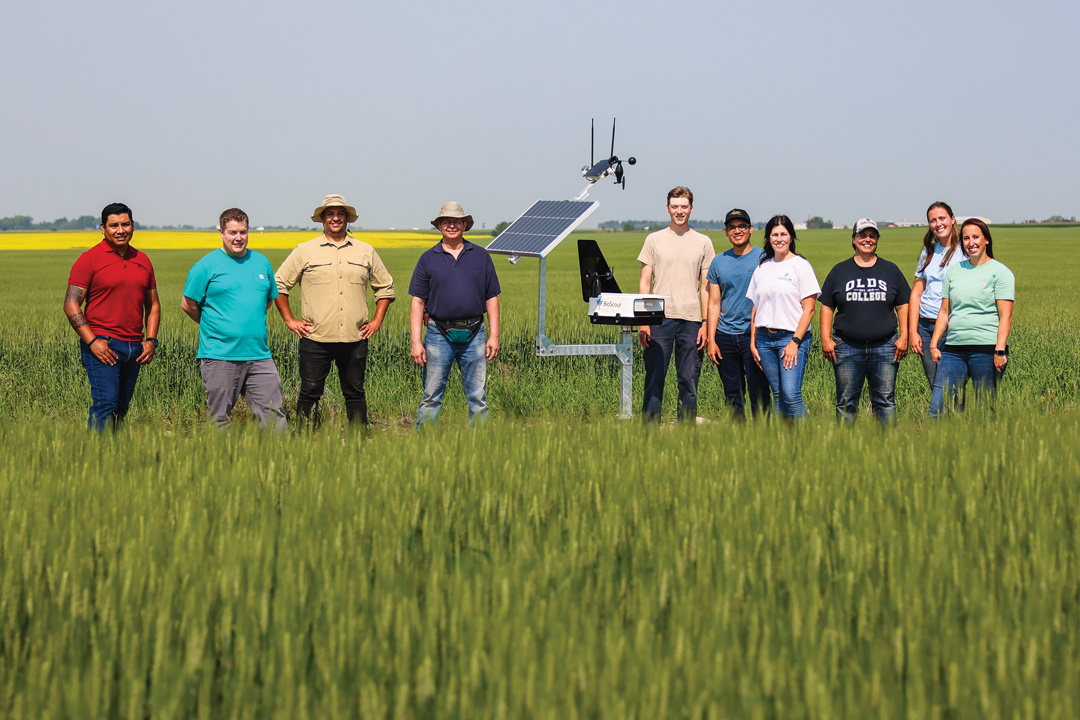TEST CASES
BY ABBY SIM • PHOTO COURTESY OF OLDS COLLEGE
There are always many research and development projects on the go at the Olds College Centre for Innovation (OCCI), the applied research division at Olds College of Agriculture & Technology. Industry partners join forces with the department to develop and test a wide variety of innovative products in the core areas of crop and livestock production, environmental stewardship, technology integration and data science and utilization.
No one’s favourite farm task, rock picking can be time consuming and not always thorough. However, removing rocks from cultivated fields can prevent damage to farm equipment such as combines and forage harvesters. OCCI and Threshold UAV (“What drones can and can’t do” pg. 14) conducted drone flights on the Olds College Smart Farm from May 21 to July 19 to validate the use of the startup company’s drone swarm with a GPS rock mapping application. Intended to make rock picking more efficient, it can design a route to optimize the farmer’s path. It can additionally filter by rock size.
While OCCI conducted a flight with a DJI Matrice 300 RTK drone, Threshold UAV launched a swarm of DJI Mini 4 Pro drones. In a Smart Farm field, both collected digital imagery that will be compared for accuracy. Threshold UAV will then utilize the imagery for the creation of a digital rock picking map by a third party. On foot, the OCCI team collected georeferenced data to confirm rock locations identified by the map. They also made note of rocks not identified by the map. After having validated the map with the georeferenced data, the OCCI team manually removed the rocks from the field. This collected information will be used to improve the Threshold UAV swarm drone application as well as the rock mapping algorithm.
OCCI also partners with agricultural commissions to conduct research. Backed by a grant from Results Driven Agriculture Research, it is collaborating with Alberta Grains and volunteer farmers to improve field-scale crop trials.
Led by the University of Illinois, the Data-Intensive Farm Management (DIFM) project created an on-farm precision experimentation methodology to implement field trials utilizing current technology. Implementation of these trials requires the creation of Latin square, or checkerboard prescription maps. These maps can be downloaded to the ag machine’s computer to control application rates. The DIFM developed a web platform that takes simple inputs from the user to create prescription maps.
In a project launched May 1 and ongoing until March 2026, OCCI and Alberta Grains will evaluate the potential of this new field trial methodology and platform to improve the understanding of the effect of seed and nitrogen rates for wheat. Studies conducted in the U.S. and elsewhere have proven the system is efficient in the creation of variable rate prescription maps that maximize profit and reduce environmental impact. OCCI expects similar positive results including the improvement of soil-type-based regional fertilizer recommendations. The project began this year with nitrogen and fertilizer rate trials conducted by three partner farmers. It will expand to include between eight and 12 central Alberta fields in 2025. To take part in the project, farmers and agronomists can contact Blair Bateman at bbateman@oldscollege.ca.
For more information about ongoing Smart Farm applied research projects, visit oldscollege.ca/smartfarm.
Abby Sim is OCCI research lead for smart agriculture applied research.






Comments